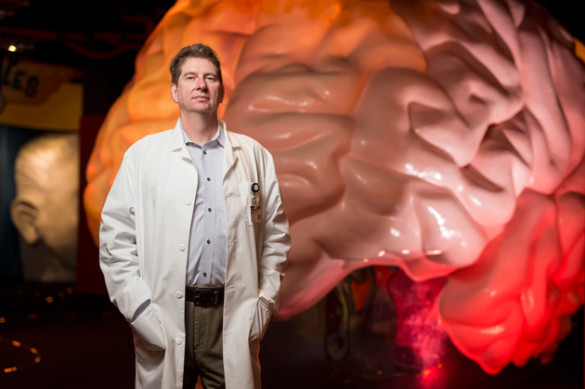
Homecoming came early this year for Vanderbilt alumnus David Sweatt, who joined the faculty as chair of Pharmacology this summer, 30 years after receiving his Ph.D. from the department he now leads.
“Vanderbilt has one of the leading pharmacology departments in the world, so I was immersed in its culture of excellence back when I was a student,” Sweatt said. “It’s exciting and a little bit intimidating to come back as the chair, but I’m delighted to be able to return in this particular role.”
Sweatt’s research seeks to uncover how a chemical process called cytosine methylation affects the expression of genes that drive functional changes in the central nervous system, with a focus on how those changes affect learning and memory.
The last time Sweatt was here, he was studying the biochemistry of blood platelets. But as he prepared for postdoctoral study, he realized that he was about to take his first steps toward specialization and that his passion lay not in the blood but in the brain. “[rquote]I spent a week thinking about this and asking myself, ‘What’s the most interesting thing in the world?’ And for me, the most interesting thing in the world was how learning and memory work,”[/rquote] Sweatt said.
That led him to a fellowship at Columbia University with Nobel Prize-winning neuroscientist Eric Kandel—and trailblazing a career of his own. About 10 years ago, Sweatt found that memory formation begins in a part of the cell that scientists believed was immutable: DNA. But, in fact, those chemical changes in DNA are a normal and necessary part of how the brain converts a behavioral experience into a memory. Understanding how that process happens—and how it can go wrong—is key to teasing apart the roots of cognitive disorders such as intellectual disabilities, learning disabilities, Alzheimer’s and more.
Sweatt is excited to be back in a pharmacology department. He’s looking forward to applying his research to the discovery of drugs and other interventions that could help the kinds of diseases and disorders he’s spent his career trying to understand better.
Before returning to Vanderbilt, Sweatt spent 17 years at Baylor College of Medicine in Houston, then was the Evelyn F. McKnight Endowed Chair in the Department of Neurobiology, director of the Civitan International Research Center, and director of the McKnight Brain Institute at the University of Alabama in Birmingham.
View the complete list of new university faculty for 2016-17.
View the complete list of new medical faculty for 2016.